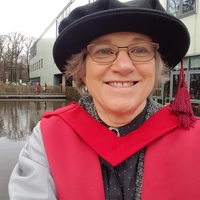Lynn Bassett
Lancaster University, Division of Health Research, Graduate Student
- Retired healthcare chaplain with an interest in the value of silence in human relationships.edit
Simon Kovar was one of the principal bassoon pedagogues in the United States between 1923 and 1957. Born in 1890 in Vilna, Russia, he attended the St. Petersburg Conservatory to study violin with Leopold Auer. At Alexandre Glazunov’s... more
Simon Kovar was one of the principal bassoon pedagogues in the United States between 1923 and 1957. Born in 1890 in Vilna, Russia, he attended the St. Petersburg Conservatory to study violin with Leopold Auer. At Alexandre Glazunov’s suggestion, due to the Bolshevik Revolution and the onset of World War I, Kovar switched to bassoon. He emigrated to the United States in 1922, where he became a member of the New York Philharmonic from 1923 to 1949. Kovar then devoted his time to teaching at a number of prominent colleges and universities. In 1948 he began editing music for the International Music Company in order to make the music he taught more readily available and to avoid spending valuable lesson time changing the music. When Kovar retired from his teaching positions in 1957, he and his family moved to Encino, California, where he lived until his death in 1970.
Towards the end of life, silence seems to take increasing prominence in caregiving relationships. A complex phenomenon, silence has been less explored than verbal interventions, yet to be an effective element of care, silence requires... more
Towards the end of life, silence seems to take increasing prominence in caregiving relationships. A complex phenomenon, silence has been less explored than verbal interventions, yet to be an effective element of care, silence requires skill and practice from professional caregivers. This research, undertaken in the United Kingdom between 2013 and 2016, sought a deeper understanding of a type of silence that contributes to palliative spiritual care. A two phase phenomenological methodology was adopted, using heuristic inquiry and hermeneutic phenomenology. Data were gathered through self-inquiry and unstructured interviews with 15 palliative care chaplains. A descriptive and hermeneutic analysis facilitated explication of the lived experience to produce an interpretation of the nature, meaning and value of spiritual caregiving silence in end-of-life care. Spiritual caregiving silence emerges as a way of being with another person, complementary to speech and non-verbal communication, ...
